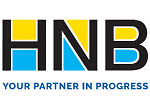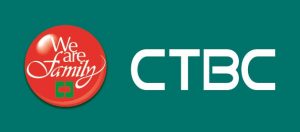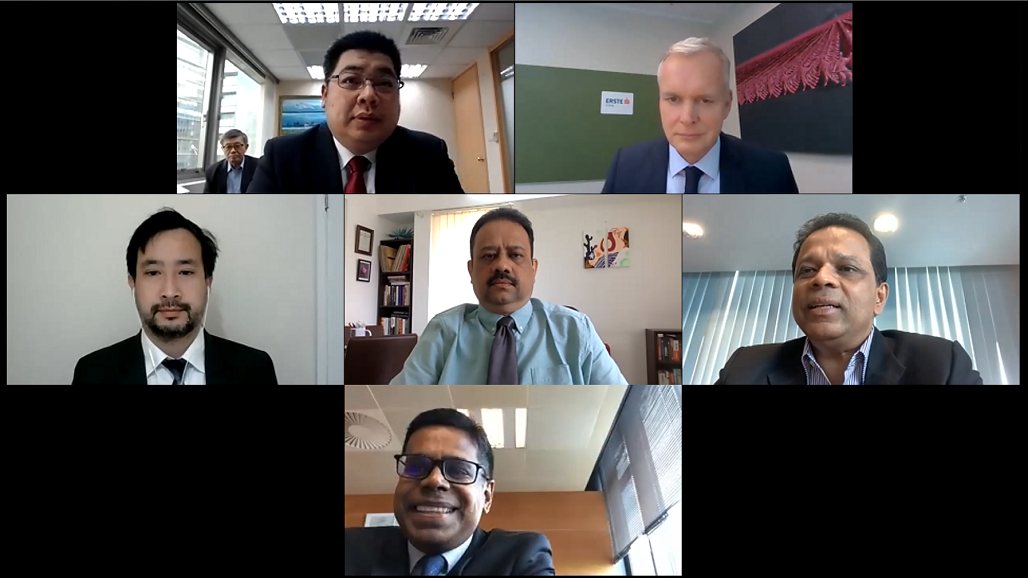The ABA Policy Advocacy Committee held on March 26, 2021 its first meeting of 2021 where five Policy Position papers were presented to an audience of more than 400 registered participants from 25 different countries..
Opened by ABA Chairman Mr. Jonathan Alles, Managing Director and CEO of Hatton National Bank (HNB), and chaired by Mr. Dilshan Rodrigo, Chairman of the ABA Policy Advocacy Committee and Chief Operating Offer of HNB, the meeting featured five Position Papers presented by representatives of ABA member banks and ABA Knowledge partners.
Hereunder are: (a) summary of each presentation, (b) link to the respective ABA position papers published in the ABA website, and (c) link to download the presentation files.
The video of the session can be viewed at the ABA Youtube channel HERE.
(1) HNB’s Experience Driving Business Revival Post-Covid in MSME Sector
 Mr. K. Indravasan, Head of SME Banking at Hatton National Bank (HNB), presented a paper sharing the experience of HNB in its efforts to help strengthen supply chain linkages of its customers, particularly the MSMEs and the SMEs, and to support their digitalization transformation.
Mr. K. Indravasan, Head of SME Banking at Hatton National Bank (HNB), presented a paper sharing the experience of HNB in its efforts to help strengthen supply chain linkages of its customers, particularly the MSMEs and the SMEs, and to support their digitalization transformation.
The complete ABA Position Paper can be read HERE.
In his presentation, Mr. Indravasan highlighted the following points:
(1.a.) HNB’s envisioned the following objectives in formulating its program to assist its MSME customers:
- Engaging with impacted clients through counseling and sharing best practices
- Commencing regional workshops and webinars on business revival
- Redefining the roles of Relationship Managers and Micro finance field officers
(1.b) To achieve these objectives, HNB provided the following services to its clients:
- Strengthening the disrupted supply chain post-Covid
- Providing direct links
- Creation of market place
- Uninterrupted financing of supply chain
- Continuous lending to agriculture sector and cottage industries during the pandemic
(1.c) HNB provided an enabling environment for its clients to embrace technology during the pandemic through the following:
- Increased usage of digital platforms
- Renewed appetite for technology-based products by MSME clients
- Development of Digital Market Place
(1.d) HNB identified the following as the challenges it faced in providing assistance to its MSME clients:
- Protecting clients during the pandemic by leveraging on changes made in the operating model of HNB in transformation
- Preparing frontline marketing and relationship management to take on mentoring and guiding role
- Adopting to new technology appetite and addressing the challenges
(2) Erste Group Bank’s From Interbank Offered Rates to Risk-Free Rates: Update
![]() Mr. Oliver Hoffmann, Managing Director, Head of Asia, Erste Group Bank AG, presented a summary of a paper on the LIBOR scenario, touching mainly on how banks can adapt to the new environment.
Mr. Oliver Hoffmann, Managing Director, Head of Asia, Erste Group Bank AG, presented a summary of a paper on the LIBOR scenario, touching mainly on how banks can adapt to the new environment.
The complete ABA Position Paper can be read HERE.
Mr. Hoffmann’s presentation outlined the following:
- An update on Risk-Free-Rates (RFR)
- RFR volumes have remained small
- Recent and remaining milestones in the LIBOR environment
- A summary of the March 5, 2021 announcements made by the Financial Conduct Authority (FCA), which constituted mainly of an index cessation event under the IBOR Fallbacks Supplement and the ISDA 2020 IBOR Fallbacks Protocol for all 35 LIBOR settings
- Key issues pertaining mainly to spread adjustment, term rate, and increasing regulatory pressure
- A summary of RFR issues made by banks in the Asia-Pacific region
- A checklist of key considerations for Asian banks classified according to the following topics:
(a) Program governance, (b) Transition management program, (c) Communication strategy, (d) Identifying and validating exposures, (e) Developing product strategy, (f) Risk Management, (g) Transition of contracts, (h) Operational and technology readiness, (i) Accounting and reporting, and (j) Taxation
(3) WWF’s Long-Term Decarbonisation Planning for Banks
 Dr. Adrian Fenton, Vice President, Asia Sustainable Finance, World Wide Fund for Nature (WWF) Singapore, presented a paper on the need for cooperation in promoting decarbonized portfolio among ABA member banks in line with national efforts to address the issue of climate change.
Dr. Adrian Fenton, Vice President, Asia Sustainable Finance, World Wide Fund for Nature (WWF) Singapore, presented a paper on the need for cooperation in promoting decarbonized portfolio among ABA member banks in line with national efforts to address the issue of climate change.
The complete ABA Position Paper can be read HERE.
Dr. Fenton summarized the major points of his presentation as follows:
(3.1) The signals stemming from the Paris Agreement all indicate likely increased desire and requirements for enhanced disclosure and management of climate-related financial risks. These risks are expected to rise, potentially abruptly if the inevitable policy response scenario occurs as many expect.
(3.2) Forward-looking scenario and strategic planning is the most accepted way for banks to proactively address climate-related financial risks and seize opportunities associated with the market volatility resulting from the transition to low-carbon economies internationally agreed by governments.
(3.3) Target setting will be a difficult challenge and inevitably a long-term learning process. Most progress to date has been with multi-stakeholder efforts which – though new to the management and operational practices of banks – have yielded considerable benefits for all stakeholders.
(3.4) The Science-Based Targets initiative is the most widely utilised multi-stakeholder initiative helping banks to develop targets which support forward-looking scenario and strategic planning in a manner which deals with the problems associated with the inevitable policy response.
(3.5) The initiative certainly has limitations, such as methodological and data problems. However, perfection should not be the enemy of progress, and waiting is not a luxury banks have if they are to proactively address the transition risks associated with the low-carbon transition.
(4) CTBC’s Opportunities and Challenges of Digital Transformation
 Mr. Friedman Wang, Executive Vice President, Division Head, Financial Technology Development Center, Data Intelligence R&D Division, CTBC Bank Co. Ltd. presented a paper sharing his perspectives on how ABA member banks can collaborate with each other in their common journey towards a digitalized environment.
Mr. Friedman Wang, Executive Vice President, Division Head, Financial Technology Development Center, Data Intelligence R&D Division, CTBC Bank Co. Ltd. presented a paper sharing his perspectives on how ABA member banks can collaborate with each other in their common journey towards a digitalized environment.
The complete ABA Position Paper can be read HERE.
Mr. Wang’s presentation highlighted the following:
(4.1) Technological advancement has grown exponentially, as shown by the growth in the cumulative number of significant inventions
(4.2) US consumers are accelerating adoption of digital channels, a trend seen across global regions, with some 73% of banking customers seen as having adopted digital technology.
(4.3) Internal challenges of digital transformation in banking include the following:
- Strategy of the company – As resources and budgets are limited, should we choose to change the bank or run the bank?
- Organizational baggage – These include the Silo effect (The lack of horizontal communication makes traditional banks difficult to push forward digital transformation); and Complicated system infrastructure (Outdated system that is hard to quickly iterate can’t keep up with customers’ changing needs); and
- Talents (The ever-evolving manpower requirements have forced financial institutions to rethink how to acquire and retain tech talents)
(4.4) External challenges of digital transformation in banking include the following:
- Emerging FinTech startups – The financial industry must embrace ecosystem strategy if it wants to enhance its competitiveness and profitability, and fight against emerging rivals such as technology companies and internet-only banks.
- Customers that are highly digitalized due to emerging technologies – Banks need to change from product-centric to situation-centric, focusing on customers’ needs
(4.5) Opportunities and Benefits for CTBC from Digital Transformation include the following:
- Due to the impact of COVID-19, digital financial services have been highly accepted
- Customer-centric digital culture and agile mindset have promoted bailout loan approval
- Lowering the investment threshold has resulted in inclusive financing
- Catching customer preferences has helped create hyper-personalization
- Embracing ecosystem strategy improves access to customers that otherwise cannot be served
(5) Fintelekt’s Maintaining the Spotlight on AML/CFT in the Post-Covid19 World
![]() Mr. Shirish Pathak, Managing Director, Fintelekt Advisory Services, presented a paper providing recommendations for AML compliance professionals within member banks to assume leadership role within the bank, becoming more and more valuable as true advisors internally.
Mr. Shirish Pathak, Managing Director, Fintelekt Advisory Services, presented a paper providing recommendations for AML compliance professionals within member banks to assume leadership role within the bank, becoming more and more valuable as true advisors internally.
The complete ABA Position Paper can be read HERE.
Major points in Mr. Pathak’s presentation included the following:
(5.1) Over the last year, the Covid-19 pandemic and resultant disruption to the global economy has presented new challenges to the AML compliance teams within banks in terms of operational difficulties, especially in AML monitoring and reporting, emergence of new threats and vulnerabilities, and in many cases, costs and budgetary pressures.
(5.2) At the start of the pandemic, several regulators took a lenient approach towards banks and financial institutions, making allowances for delays in reporting and supervision. However, increasingly the regulatory expectation from banks is to continue to track new and emerging typologies and keep up the monitoring and reporting rigour. AML compliance departments are also expected to play a crucial role in maintaining business continuity and protecting the institution from the threats posed by the dynamic Covid-19 environment.
(5.3) For AML compliance professionals within member banks to assume a leadership role within the bank, becoming more and more valuable as true advisors internally, the following measures are recommended
- Creating a culture of compliance and strategically guiding the organisation away from treating AML compliance as a tick-in-the-box item, making it a compliant and sustainable organization
- Demonstrating the return on investment (ROI) from AML compliance to the top management and Board of Directors
- Keeping pace with growing regulatory expectations and international standards around AML/CFT
- Human resource management in terms of relevant and on-going training and skill-building to ensure a workforce that is ready and equipped to fight financial crime.
(6) Future Policy Advocacy Work
The Committee considered and exchanged views on possible issues for policy advocacy work of ABA over the next few months to be taken up at the next Committee meeting in August 23, 2021. Among the themes for future presentations were the following:
- Update on the LIBOR scenario.
- Establishment of ecosystem aimed at strengthening supply chain linkages
- Financial sanctions on banks and how they mitigate their impact.
- Corruption issues amidst the Covid-19 situation
- How to speed up development in poorer countries and help them achieve financial inclusion post-Covid.
- Sustainable finance regulation landscape across the region
- Cyber security and what banks are doing to strengthen their capabilities
- Implementation of sustainability framework set by regulators
The video recording of the ABA Policy Advocacy Committee Meeting can be viewed here.


Leave a Reply